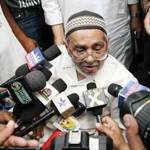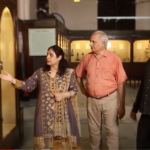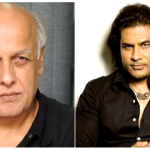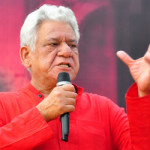Humsaya, the Pakistani theatre festival currently on in Delhi, provides an opportunity for artistes to connect, present their art and share thoughts
In the backdrop of a Pakistani theatre festival being held in Delhi, artistes from India and Pakistan tell us that their art, unlike films, stays away from controversies.
Films made on India and Pakistan primarily tread two paths ¬– a goody-goody portrayal of the people in both countries wanting peace or one that’s associated with some real life incident that causes enmity, fuelled by jingoism. So, for instance, despite being products of same director, a Bajrangi Bhaijaan will be well-received, while a Phantom will be banned.
Cinema’s poor cousin, theatre, however, has never shown any eagerness to represent the neighbour in a bad light. Despite the ripples created recently by Pakistani theatre director Madeeha Gauhar’s comments on their plays being `ignored’ here, the general atmosphere in theatre is of a cordial exchange, with a festival of Pakistani plays started a couple of days ago in Delhi.
Artistes on both side of the border say that theatre, unlike films, is not commercialised and, like any other art form, always looks to strengthen ties between the countries.
THEATRE ARTISTES WANT TO LEARN FROM EACH OTHER
 Humsaya, the ongoing Pakistani theatre festival in the capital, is staging four plays by Ajoka Theatre: Dara, Bullah, Kaun Hai Ye Gustakh and Lo Phir Basant Ayee. None of these plays touch upon the more contentious topics between India and Pakistan. Shahid Nadeem, an award-winning Pakistani playwright who scripted all four plays, has been to India a number of times. He terms the likes of Habib Tanvir and Badal Sarkar as friends-cum-mentors.
Humsaya, the ongoing Pakistani theatre festival in the capital, is staging four plays by Ajoka Theatre: Dara, Bullah, Kaun Hai Ye Gustakh and Lo Phir Basant Ayee. None of these plays touch upon the more contentious topics between India and Pakistan. Shahid Nadeem, an award-winning Pakistani playwright who scripted all four plays, has been to India a number of times. He terms the likes of Habib Tanvir and Badal Sarkar as friends-cum-mentors.
Nadeem explains, “Theatre in Pakistan has suffered a lot as the state never really supported plays that had a social message. Theatre found more acceptance in India and as a result, it grew. We, who are in the arts, are here to learn from each other. Even when theatre picks up controversial issues, it treats them in a generalised manner. Any form of art will steer clear of promoting prejudice or hatred. Theatre believes in self-criticism. For example, we have been challenging the many misinterpretations of Islam or history through our plays.“
THEATRE IS PART OF THE PEACE-BUILDING PROCESS
 In 2013, Ajoka’s Kaun Hai Ye Gustakh and National Academy of Performing Arts’ (NAPA) Mantorama was cancelled by the National School of Drama (NSD) owing to the tension between the two countries at the time. Since then, Ajoka has staged its plays in both Delhi and Gurgaon.
In 2013, Ajoka’s Kaun Hai Ye Gustakh and National Academy of Performing Arts’ (NAPA) Mantorama was cancelled by the National School of Drama (NSD) owing to the tension between the two countries at the time. Since then, Ajoka has staged its plays in both Delhi and Gurgaon.
Prior to this controversy, NSD’s annual theatre festival Bharat Rang Mahotsav (BRM) had seen many Pakistani plays being staged. When asked about the absence of Pakistani plays in the BRM line-up since 2013, NSD director Waman Kendre had said earlier this year, “We have an impartial selection panel. For the last two years, no Pakistani play has been able to make the cut. There has been no conscious effort to keep them out.“
Rakesh Gupta, organiser of Humsaya, says, “Films play on the passion of people in order to gain their attention and earn more.“ But ask Gupta if he would ever stage a play that shows India in a poor light and he retorts, “No way. I am an Indian first.“
Ask the same question to Waman Kendre, director, NSD, and he replies, “Films deal with reality, but theatre dwells on fantasy. It looks at the world with the hope that things will be alright. Also, why should a Pakistani play be anti-India in the first place or an Indian play be anti-Pakistan? Theatre is part of the peace-building process. As artistes, we seek an unbiased world.“
THEATRE DOESN’T LOOK AT POLITICAL DISCOURSE
In March this year, the theatrical adaptation of Mahesh Bhatt’s film Daddy was staged in Karachi in at the NAPA theatre festival. The director-producer was happy with its reception.
“ A totalitarian way of thinking or fascist ideology is the death knell for any creative endeavour. Though theatre has had a field day in India, it is still at a nascent stage in Pakistan. Theatre is a peaceful entity and thus, it stays away from anything that can become controversial and doesn’t bother with political discourse,“ says Bhatt.
 The filmmaker would like to stage his other production, The Last Salute in Pakistan. The play is based on Iraqi journalist Muntadhar Al-Zaidi’s book The Last Salute To President Bush (which narrates the series of events that led Al-Zaidi to hurl his shoe at former US President George W. Bush). “We were able to stage the play here, but when we approached Pakistan’s officials, we didn’t receive any reply,“ he explains.
The filmmaker would like to stage his other production, The Last Salute in Pakistan. The play is based on Iraqi journalist Muntadhar Al-Zaidi’s book The Last Salute To President Bush (which narrates the series of events that led Al-Zaidi to hurl his shoe at former US President George W. Bush). “We were able to stage the play here, but when we approached Pakistan’s officials, we didn’t receive any reply,“ he explains.
Imran Zahid, who plays the protagonist in all the theatrical adaptations of Bhatt’s films, says, “Bhatt sahab and I have always maintained that a movie or a play can be a more powerful messenger of peace than any lecture we can give. Any message, if communicated through storytelling, strikes a chord with audiences. We are trying to do the same. I think India and Pakistan are young countries and theatre is something that attracts the youth. People say we have utopian and unrealistic ideas about Indo-Pak relations, but we have a firm conviction that through sharing this cultural space, the two countries can bridge a lot of distance.“
He also says that Hamari Adhuri Kahani, a Bhatt film adapted into a play, will be staged in Lahore and Karachi in mid-October with the Pakistani band Raeth providing the music.
Bhatt will also shortly be presenting Milne Do, a play featuring theatre actors from both countries, jointly directed by an Indian and a Pakistani. Zahid said he’s approached Mansoor Ahmed Khan, deputy high commissioner, Pakistan high commission, for co-operation, who has assured him full support for the production.












